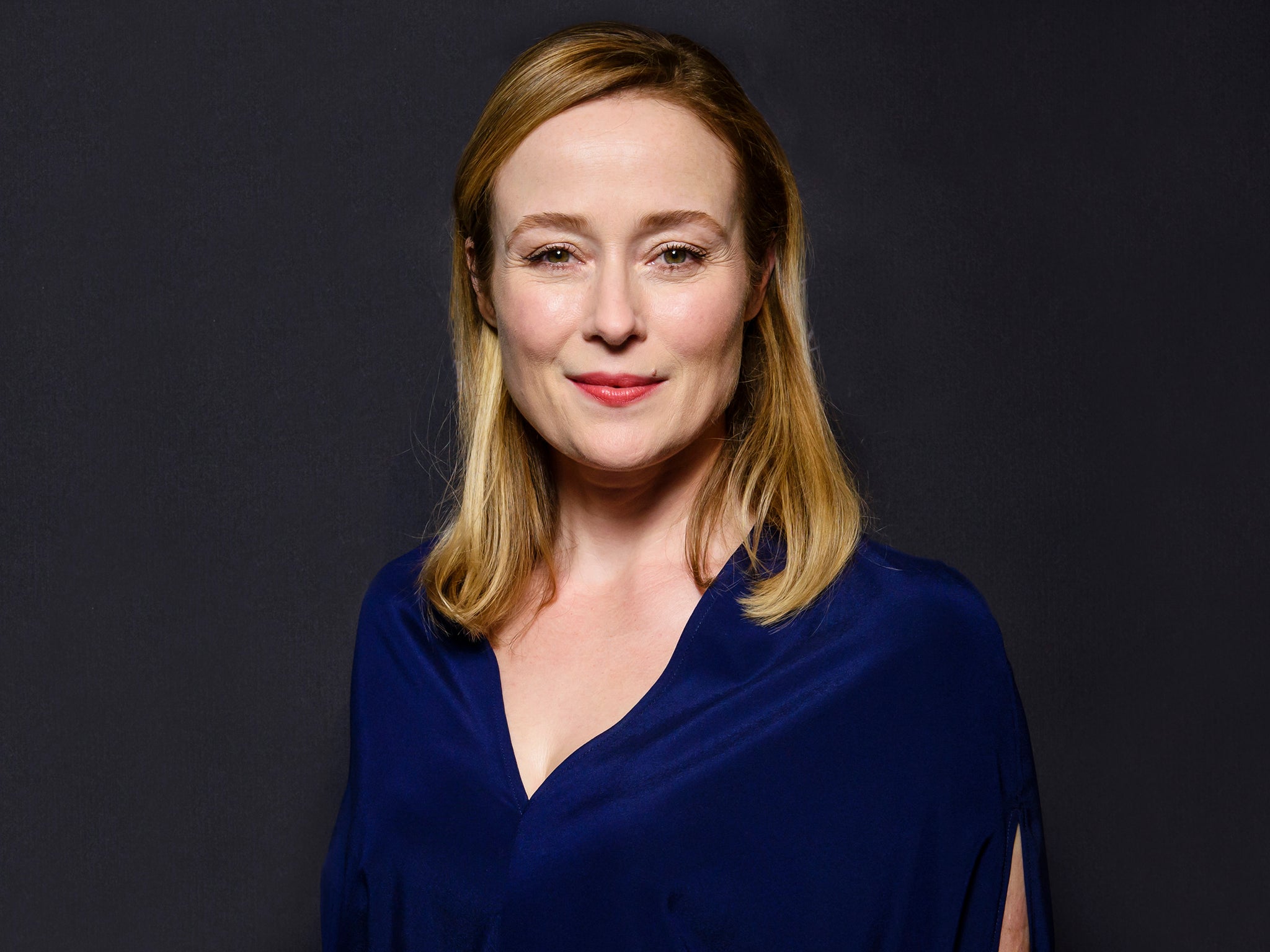Jennifer Ehle: ‘Working on Contagion, we all realised this was going to happen at some point’
The ‘Pride and Prejudice’ star talks to Helen Brown about her ‘gut-wrenchingly good’ new horror film ‘Saint Maud’, her chickens, and predicting the pandemic


Your support helps us to tell the story
From reproductive rights to climate change to Big Tech, The Independent is on the ground when the story is developing. Whether it's investigating the financials of Elon Musk's pro-Trump PAC or producing our latest documentary, 'The A Word', which shines a light on the American women fighting for reproductive rights, we know how important it is to parse out the facts from the messaging.
At such a critical moment in US history, we need reporters on the ground. Your donation allows us to keep sending journalists to speak to both sides of the story.
The Independent is trusted by Americans across the entire political spectrum. And unlike many other quality news outlets, we choose not to lock Americans out of our reporting and analysis with paywalls. We believe quality journalism should be available to everyone, paid for by those who can afford it.
Your support makes all the difference.Oh! You have chickens? Please tell me about them. We once had a Buff Orpington called Igor Sikorksy – you know, after the aircraft designer – and she followed me everywhere!” Often admired for the quiet dignity of her screen presence, Jennifer Ehle is a surprisingly sweet and breathless conversationalist. She’s self-conscious when asked “interviewy questions” about her career, but more than happy to chat about chickens, or the weather, or her voracious reading of everything from “shallow mysteries” to modern classics by Milan Kundera and Michael Ondaatje. “I just recorded The English Patient as an audiobook. There’s nothing better than reading aloud, is there? My husband and I read stories to each other when we first met. Such a joy.”
Even though we’ve heard it onscreen in films such as Contagion and Zero Dark Thirty, Ehle’s American accent is also unsettling. Perhaps because she’ll always be lodged in the nation’s hearts as the definitive Lizzie Bennett she played opposite Colin Firth in Andrew Davies’s BBC adaptation of Pride and Prejudice.
But while Ehle hopes the old Austen adaptation, which has been freshly remastered for its 25th anniversary this autumn, offers “much-needed comfort viewing” to those feeling stressed by the horrors of 2020, she’s talking to me today about her role as a terminally ill dancer in the bloodcurdling new horror film Saint Maud. About as different from the adorable Lizzie B as it’s possible for a woman be, her character Amanda is briskly described in the film’s opening scenes as “a bit of a c***”. “Ahhh, yes, Ah-mahnd-ah...” drawls Ehle, in her character’s theatrical accent. “Sooo much fuuun to play.”
Written and directed by newcomer Rose Glass, Saint Maud plunges viewers into the tormented soul of lonely young hospice nurse Maud (Morfydd Clark), as she becomes obsessed with converting loose-living Amanda to Roman Catholicism. Confined together in Amanda’s grand old spooky house, on the cliffs above a shabby British seaside town, the two women become locked into a co-dependent spiral of mutual condemnation. The ailing dancer cruelly mocks her nurse’s sanctimony and the nurse tips her charge’s booze down the sink.
The director Danny Boyle, who led the jury for a film bursary won by Glass, noted how the film’s combination of “mordant humour” and “ecstasy” channels horror classics such as The Exorcist and Carrie. But Saint Maud also taps into two very current fears: the madness that can arise when frightened people are locked together in one place, and our vulnerability to the carers in whom we must place our trust.
“Neither Maud nor Amanda are ‘typical’ of the women we’re used to seeing in horror films,” says Ehle, 50, on the phone from the rural home she shares with her husband, the writer Michael Ryan, and two children in upstate New York. “They’re both very strong, multifaceted characters and the film plays with the power balance between and within them. Amanda’s a successful, charismatic woman, but she’s dying and she needs this unsophisticated, self-punishing loner to look after her.”
Born in Winston-Salem, North Carolina, in 1969, Ehle (pronounced EE-lee) is the only child of British actor Rosemary Harris and American author John Ehle. She made her stage debut, aged three, in the first Broadway revival of Tennessee Williams’s A Streetcar Named Desire. “My mother was playing Blanche Dubois,” she recalls, “and my first memory of the theatre is being at the back of the stalls trying to watch the dress rehearsal and the director, Ellis Rabb, kept standing in front of me and moving to block my view of what was happening on stage. I now realise that was the rape scene.”
Two of the other cast members had small children at the time and the trio were cast as passing guests at a birthday party. “We all had little balloons to hold,” recalls Ehle, “and I remember my first steps onto that stage so clearly. I remember walking out of the wings and that extraordinary, wonderful feeling opening up from the blackness behind the lights on my left. I couldn’t see anybody and yet this intense feeling of the audience’s presence was so tangible. I had all that attention. It was incredible.” Clearly pining for the collective experiences we’ve lost in 2020, she adds: “Do you know, when audiences watch a play, their heart rates synchronise? It’s magic.”
Though her parents’ peripatetic lifestyle meant that Ehle attended 18 schools (in both the UK and US), she credits their “wonderful, compassionate, energetic” engagement with life for teaching her that work is important but “you put your family first”. Her first brush with personal fame was a difficult experience; she has spoken of her discomfort with the world seeing her nude, aged 21, as the sexually fickle Calypso in Peter Hall’s TV adaptation of The Camomile Lawn in 1992. After one day of filming the drama (in which her mother played the older version of her character), Ehle was so stressed, she was physically sick.

Watch Apple TV+ free for 7 days
New subscribers only. £8.99/mo. after free trial. Plan auto-renews until cancelled

Watch Apple TV+ free for 7 days
New subscribers only. £8.99/mo. after free trial. Plan auto-renews until cancelled
There was no chance of any sex scenes in 1995’s Pride and Prejudice, although Davies did sex it up with Colin Firth’s lake plunge. Firth has recently spoken about how his role as Mr Darcy saw him typecast for years (“Looking good and strutting around is very boring. I wanted to do other things as an actor,” he told The Times in April). However, Ehle – who had a brief romantic relationship with Firth after filming the series – says the success of the show gave her the power to pick the roles she sought and today she tells me she has “never regretted any of my choices”.
It’s hard to get her to talk about them though. A pure anti-diva, she politely winces away from my questions and begs me to discuss her love of pet chickens instead. Steven Soderbergh, who directed her in viral epidemic thriller Contagion, has said that “whatever her process is, Jennifer has that British or at least half-British quality of not burdening other people with it”.
Released in 2011, Contagion is the film that should have warned us what a global pandemic would look and feel like. The virus in it even jumped the species gap from bats like Covid-19. Ehle played a smart, quirky scientist who develops a vaccine and tests it on herself.
“Working on that job,” she says, “we all realised that this was something that was going to happen at some point. None of this is a surprise to virologists. I think the only surprise is how political it’s all become.”
A quiet observer of human nature, Ehle is concerned about how the pandemic is changing our behaviour. “I was watching my daughter playing with her friends in a field the other day,” she says. “They were all wearing masks and keeping their distance. It’s strange how quickly they've internalised all the rules and how it’s changed the way they play.”
Ehle also worries “that we might all emerge from this situation with an adrenaline addiction”. But as a huge fan of horror movies, she thinks films like Contagion might have helped viewers “to find a way to become comfortable with discomfort. Part of us doesn’t want to deal with the scary stuff, but the other part knows it’s essential to acclimate ourselves. We have to work out how to thrive in situations that aren’t coddling. Because human life is, for the most part, a mix of feeling incredibly safe and incredibly stressed.”
She’s also curious about a culture which is at once pushing for us to release all our emotions and not offend anybody else. As a more reserved person, Ehle suspects that “as a human being, it’s hard to know which of our thoughts to trust. It’s such a mistake to think that everything we think or feel is true.”
The truth of this is born out in Saint Maud, in which psychosis warps the worldview of a genuinely well-meaning young woman. Ehle says that actors are regularly reminded that they’re not necessarily seeing the whole picture, and that contexts are always shifting. “I loved making Saint Maud, but I had no idea how gut-wrenchingly good it would be until I saw it. So much of the strangeness and tension is added in the soundtrack which vibrates your innards. It was so amazing to watch it and just think: ‘Oooohh! I’m in one of my favourite movies!’”
Saint Maud is out in UK cinemas now



Join our commenting forum
Join thought-provoking conversations, follow other Independent readers and see their replies
Comments